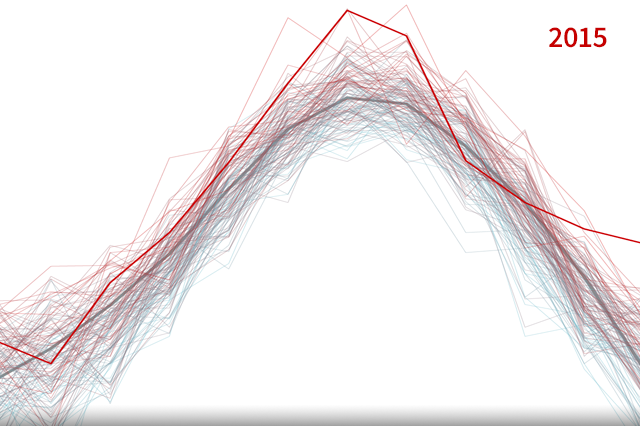Infectious diseases among main reasons for heat-related hospitalisations

Scientists have found that the heat waves which hit Switzerland in 2015 led to more than 2,700 emergency hospital admissions. The faster spread of viruses and bacteria in high temperatures appeared to be a decisive factor.
Several studies have already shown that extreme heat leads to increased mortality rates. The three heat waves between June and August 2015 made for the second hottest summer on record in Switzerland and caused about 800 additional deaths. But until now few studies have analysed the effect of heat waves on diseases and hospital admissions.
Researchers at the Swiss Tropical and Public Health InstituteExternal link (Swiss TPH), which conducted the analysis, said in a statement on Thursday that the elderly and people living in the hottest areas – Ticino and the Lake Geneva region – were most affected by the 2015 heat waves.

More
July heatwave adds to one of hottest Swiss summers on record
The most common reasons for emergency hospital admissions were infectious diseases, diseases of the urogenital system, diseases of the digestive system, influenza and pneumonia.
“These causes are surprising because heat-related deaths are mainly due to cardiovascular and respiratory illnesses,” said Martina Ragettli, a scientist at Swiss TPH and the study’s lead author.
The faster spread of viruses and bacteria when temperatures are high appears to have a decisive effect on hospital admissions.
“The data from this study and other research show that the first heat wave of a summer has a major impact on deaths and illnesses,” Ragettli added. “The impact is also even greater when the heat wave occurs at the beginning of summer.”
The authors of the study, which was commissioned by the Federal Office for the Environment and is published in the journal Environmental Health, are urging cantons to expand their heat action plans on the basis of these results – for example, by making recommendations on infectious and parasitic diseases.
Surveys show that cantonal action plans are crucial for health protection during hot weather. Even relatively simple measures have a positive impact, the Swiss TPH said.

More
What ‘dangerously hot’ means in Switzerland
Keystone-SDA/gw

In compliance with the JTI standards
More: SWI swissinfo.ch certified by the Journalism Trust Initiative



You can find an overview of ongoing debates with our journalists here. Please join us!
If you want to start a conversation about a topic raised in this article or want to report factual errors, email us at english@swissinfo.ch.